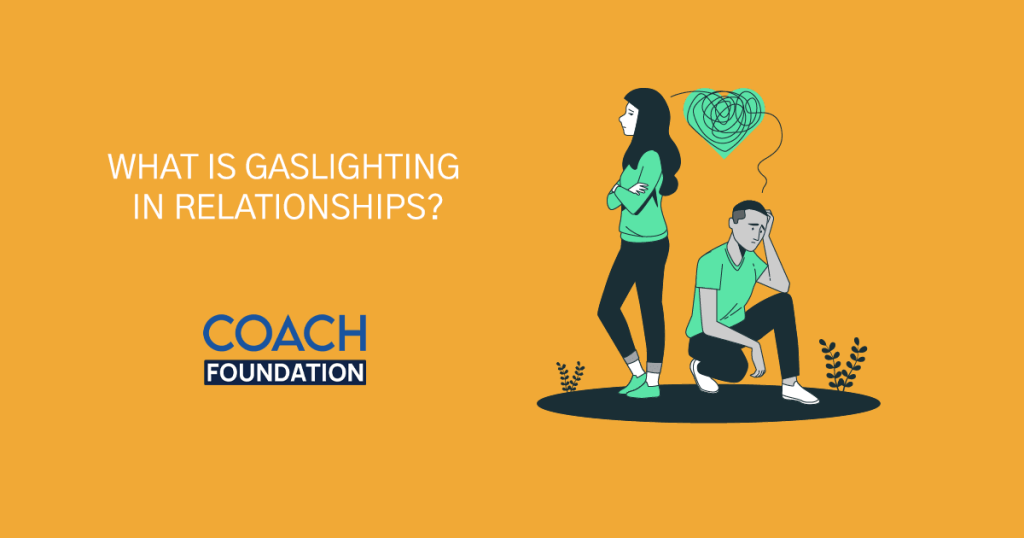Blog » Psychology Coaching » What Is Gaslighting in Relationships?
What Is Gaslighting in Relationships?
Do you ever feel like you’re going crazy in your relationship? You might be experiencing gaslighting. Gaslighting is a manipulative tactic used by someone to make you doubt your own sanity and perception. In this article, we will explore the definition of gaslighting, the signs to look out for, and the detrimental effects it can have on relationships.

Additionally, we will discuss how consulting with a coach can be helpful in navigating gaslighting situations.
Definition of Gaslighting in Relationships
Gaslighting is a form of psychological manipulation where one person intentionally makes the other doubt their own reality.
It’s a toxic tactic used by manipulative individuals to gain control and power over their partners.
Gaslighting can be subtle or overt, but its effects are harmful and damaging to the victim’s mental and emotional well-being.
In a gaslighting relationship, the abuser will often distort the truth, deny their actions, and twist events to make the victim question their own memory, perception, and sanity.
They may constantly invalidate their partner’s feelings and experiences, making them feel confused, insecure, and isolated.
Gaslighting is a form of emotional abuse that erodes the victim’s self-esteem and confidence, leaving them dependent on the abuser.
Signs of Gaslighting in Relationships
Here are some signs of gaslighting in relationships:
Emotional Abuse
Emotional abuse can be just as damaging as physical abuse, but it can be harder to identify because there are no visible scars.
It involves a pattern of manipulative behaviors aimed at undermining your self-esteem, confidence, and sense of reality.
Some common signs of emotional abuse include constant criticism, belittling, humiliation, and controlling behavior.
The abuser may also isolate you from friends and family, withhold affection, or use guilt and manipulation tactics to gain control over you.
It’s important to recognize these signs and take steps to protect yourself from further harm.
By understanding the signs of emotional abuse, you can begin to break free from the cycle of gaslighting and regain your sense of self.
Psychological Manipulation
One of the signs of gaslighting is when your partner constantly questions your memory or perception of events. They may make you doubt your own recollection, causing you to question your sanity.
Another sign is when they deny or minimize their actions, making you feel like you’re overreacting or being too sensitive.
Gaslighters also often twist your words and manipulate conversations to make you doubt your own intentions and feelings.
They may use tactics like blame-shifting or playing the victim to avoid taking responsibility for their actions.
Being aware of these signs can help you recognize and protect yourself from psychological manipulation in relationships.
Power Dynamic Changes In Relationships
If your partner starts exerting control over finances, decision-making, or social interactions, and you feel like you no longer have an equal say in the relationship, it may be a sign of power dynamic changes.
Power dynamics in relationships can shift over time, but it becomes concerning when one partner starts to dominate and manipulate the other.
Exaggerated Reactions to Minor Issues
Exaggerated reactions to minor issues are a common tactic used by gaslighters to control and undermine their partners.
They may blow up over small inconveniences or insignificant mistakes, making you feel like you’re constantly walking on eggshells. This behavior is designed to make you question yourself and feel responsible for causing your anger.
It’s important to recognize these exaggerated reactions as manipulative tactics and seek support from friends, family, or professionals to help you navigate the gaslighting dynamic and protect your mental well-being.
Sense of Reality Being Shaken Up
Your sense of reality may be shaken up if you notice consistent discrepancies between what you remember and what your partner claims happened.
Gaslighting in relationships often involves manipulating your perception of reality to make you doubt your own memory and judgment.
If you find yourself constantly second-guessing your own memories and experiences, it may be a sign that your partner is gaslighting you and manipulating your sense of reality.
Blaming and Accusation Tactics
Blaming and accusation tactics are commonly used by gaslighters to shift the blame onto you and make you feel responsible for their behavior or actions. They may accuse you of being overly sensitive, irrational, or even of lying about certain events.
By constantly pointing the finger at you, they undermine your self-confidence and make you question your own sanity.
This constant barrage of blame and accusation can have detrimental effects on your mental and emotional well-being, leading to feelings of guilt, shame, and self-doubt.
Effects of Gaslighting on Relationships
Gaslighting in relationships can have serious effects on your mental health and well-being. Down below is a list of a few major effects for your understanding.
Mental Health Complications
Gaslighting in relationships can have severe mental health complications.
One of the most common mental health complications of gaslighting is a decrease in self-esteem. Constantly being manipulated and made to doubt your own reality can lead to feelings of worthlessness and self-doubt.
This can also lead to anxiety and depression, as you may constantly question your own thoughts and actions.
Gaslighting can also cause a loss of trust in others, making it difficult to form healthy relationships in the future.
Additionally, it can contribute to feelings of isolation and loneliness, as the gaslighter often isolates their victim from friends and family.
It’s important to seek support and therapy to address these mental health complications and begin the healing process.
Impact on Self-Esteem and Sense of Self-Worth
When subjected to gaslighting in a relationship, you may experience a significant erosion of your self-esteem and sense of self-worth.
Gaslighting is a manipulative tactic used by one person to make the other doubt their own reality and perception of events. It involves the constant denial, distortion, and invalidation of your thoughts, feelings, and experiences.
Over time, this can lead you to question your own worth, abilities, and judgment. Gaslighting can make you feel inadequate, insecure, and constantly second-guess yourself.
The constant undermining and manipulation can wear away your confidence and make you doubt your own value.
It can leave you feeling powerless, trapped, and unable to trust your own instincts.
How Consulting With a Coach In Gaslighting Situations Can Be Useful
If you’re facing a gaslighting situation, consulting with a coach can be incredibly helpful.
A coach specialized in gaslighting situations can help you identify the signs of gaslighting and validate your experiences.
They can provide you with a safe space to express your feelings and concerns without judgment. A coach can also help you develop strategies to regain your self-confidence and rebuild your sense of self-worth.
They can assist you in setting boundaries and assertively confronting the gaslighter if that’s appropriate for your situation.
Furthermore, a coach can offer practical tools and techniques to help you navigate the complex dynamics of a gaslighting relationship.
They can help you develop effective communication skills and provide you with resources to educate yourself about gaslighting and emotional abuse.
A coach can also assist you in creating an exit plan and provide ongoing support as you navigate the process of leaving the toxic relationship.
Conclusion
Gaslighting in relationships is a manipulative tactic that can have devastating effects on the victim’s mental and emotional well-being.
It involves the abuser making the victim question their own reality, leading to self-doubt and confusion.
Recognizing the signs of gaslighting is crucial for maintaining a healthy relationship. Seeking support from a coach can provide guidance and validation during these situations.
Remember, no one deserves to be gaslighted, and seeking help is a sign of strength and self-care.
Frequently Asked Questions
Q: How can I protect myself from gaslighting in a relationship?
To protect yourself from gaslighting in a relationship, you should establish clear boundaries and communicate your needs openly.
Setting boundaries is crucial in maintaining a healthy relationship. Clearly define what’s acceptable and unacceptable behavior for you. This will help you identify any gaslighting tactics and stand firm against them.
Communication is key. Express your feelings, concerns, and needs openly and honestly with your partner. Gaslighters thrive on secrecy and manipulation, so being transparent and assertive can help protect you.
Trust your instincts and validate your own reality. Gaslighting often involves making you question your own perceptions and beliefs. Trust yourself and seek support from friends, family, or a therapist who can provide an objective perspective.
Q: Can gaslighting be unintentional?
It’s important to note that not all instances of gaslighting are intentional. Sometimes, the person gaslighting you may not even realize they’re doing it.
They may have learned these manipulative behaviors from their own experiences or have developed them as a defense mechanism.
Unintentional gaslighting can often be a result of deeply ingrained patterns of behavior, such as those learned from childhood or past relationships.
It’s crucial to remember that even if the gaslighting is unintentional, it can still have a detrimental impact on your mental well-being.
It’s essential to communicate your feelings and concerns with the person involved so they understand the effect of their actions an


ABOUT SAI BLACKBYRN
I’m Sai Blackbyrn, better known as “The Coach’s Mentor.” I help Coaches like you establish their business online. My system is simple: close more clients at higher fees. You can take advantage of technology, and use it as a catalyst to grow your coaching business in a matter of weeks; not months, not years. It’s easier than you think.
AS SEEN ON
0 Comment